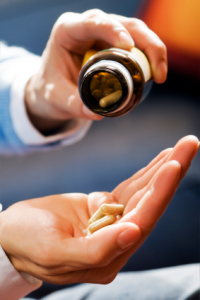PTSD and Self-Medicating
 There is currently a debate over the rates of PTSD found in populations, but despite changes in diagnosis and the criteria used to define PTSD between 1997 and 2007, epidemiological rates have not changed significantly. Those suffering from PTSD are understandably eager for relief from their symptoms, but self-medicating or even taking prescribed medications under a doctor’s advice can put an individual at risk for substance use issues or addiction.
There is currently a debate over the rates of PTSD found in populations, but despite changes in diagnosis and the criteria used to define PTSD between 1997 and 2007, epidemiological rates have not changed significantly. Those suffering from PTSD are understandably eager for relief from their symptoms, but self-medicating or even taking prescribed medications under a doctor’s advice can put an individual at risk for substance use issues or addiction.
PTSD and Co-occurring Substance Abuse
Alcohol abuse and substance abuse commonly co-occur with PTSD and can hinder or exacerbate other anxiety disorders. Substance overuse, abuse, or dependence complicates PTSD, but treating these problems can bring about a marked improvement in an individual’s mental health status and anxiety levels.
PTSD and Benzodiazepines
Benzodiazepines are a class of drugs typically used to treat panic and anxiety disorders. This makes them appealing for PTSD self-medication but does not make them a safe or effective choice. Benzodiazepines have a high abuse potential and can be especially addictive for PTSD sufferers. Ending benzodiazepine use can also be especially difficult, and recovery can take longer than that for alcohol or other drugs. PTSD symptoms can worsen during use and particularly during withdrawal.
PTSD and Male Enhancement Drugs
Male enhancement drugs, such as Yohimbine, should not be used by individuals suffering from PTSD. They release endogenous norepinephrine and can worsen PTSD symptoms and increase emotional arousal.
Need Help Finding Treatment for PTSD?
If you or a loved one is struggling with PTSD and may also be self-medicating, please call our toll-free helpline. We can provide you with information about PTSD, addiction and treatment resources. We are available 24 hours a day. Call now and get started on your path to recovery.

 We take your privacy seriously. To help ease any concerns and uncertainty about calling for drug and trauma abuse help
We take your privacy seriously. To help ease any concerns and uncertainty about calling for drug and trauma abuse help